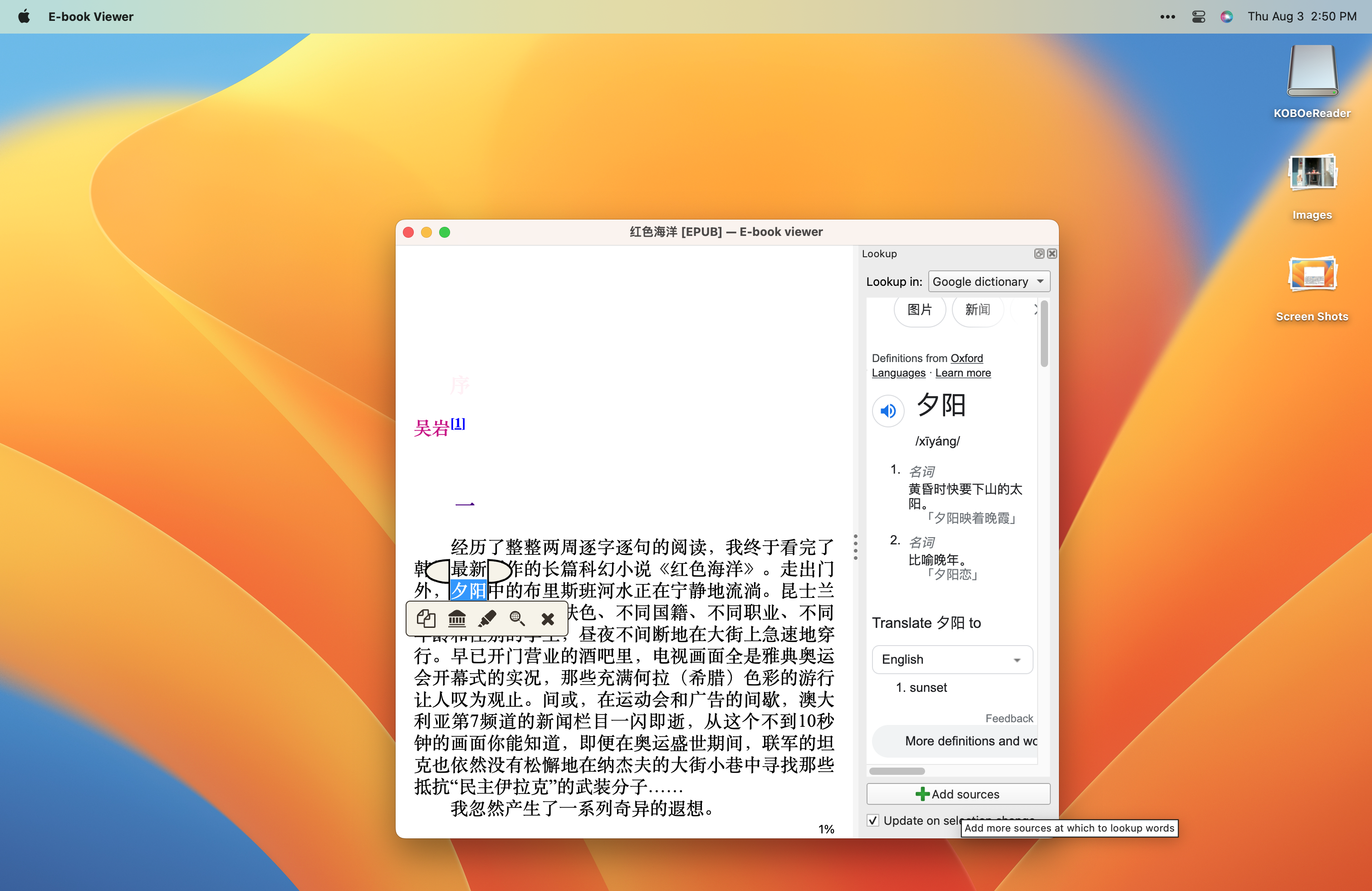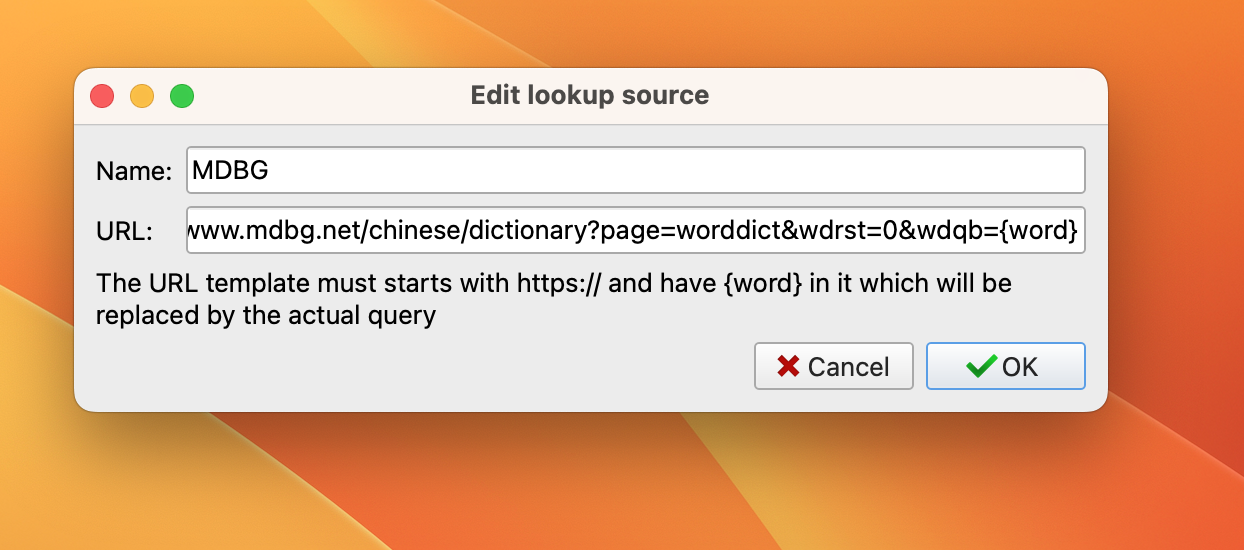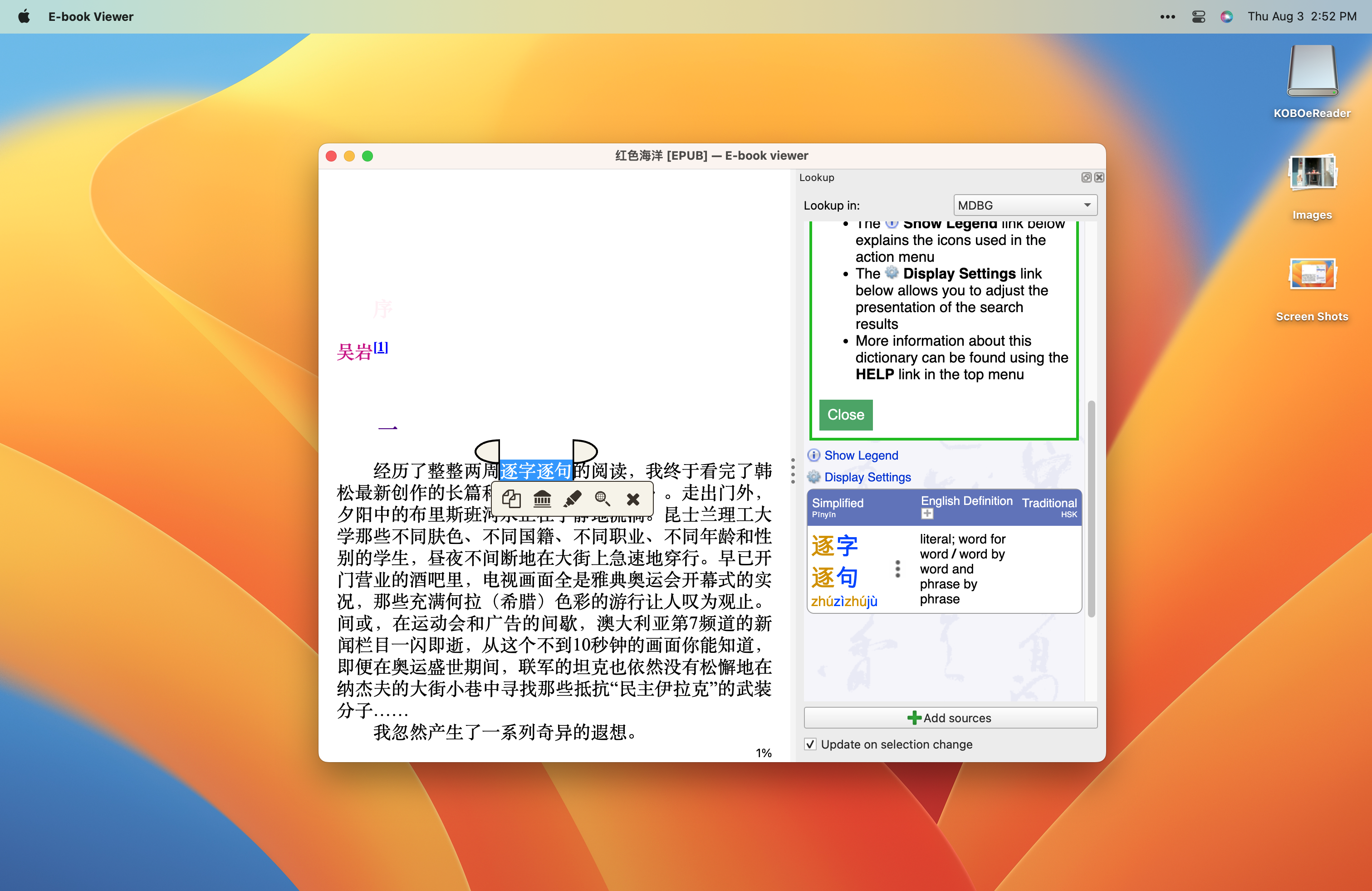August 4, 2023
I am trying to read more Chinese books. My Mandarin school teachers are probably having the last laugh, but I am genuinely interested in some of the fiction in the Sinosphere these days. Unfortunately my school-time Mandarin class experience was so poor (old school, traditional, not fun or engaging) that I feel like I am starting from scratch.
Thankfully, technology helps. I no longer have to peruse a large Chinese dictionary by looking up total number of key strokes (even though I'm glad I learned that skill). With a few things in place, I can quickly level up.
I use Calibre for ebooks. It's pretty customizable.
- Get your Chinese ebooks wherever you get them, and add them to Calibre
- Click to open and read the Chinese ebook inside Calibre's ebook viewer
- Highlight some text and mouse over the symbol that looks like a little library
- A library / lookup window should show up on the right
- Click Add Source
- Add the following source: name, MDBG
- Add the following permalink:
https://www.mdbg.net/chinese/dictionary?page=worddict&wdrst=0&wdqb={word}
Now, whenever you highlight a word or phrase, it should popup the Chinese dictionary result.
Some example photos:

Highlight text in the ebook to pop out the lookup / dictionary view on the right.

Click add source, then paste the url https://www.mdbg.net/chinese/dictionary?page=worddict&wdrst=0&wdqb={word} into the box.

If all goes well, you should now see the definitions from the Chinese dictionary.
Happy reading!
August 3, 2015
When my people speak of who we are and where we come from
We do not say, China.
When my relatives reclaim our collective past,
Those words—China—dance on our lips, foreign.
We do not say China.
We do not say China at all.
Instead, we are the people of the coast.
We are the subjects of the Tang Dynasty.
We are the rejects of the imperial court, cast out into the Nanyang sun where we sweat with the sons of the land.
My grandfather was an upright man,
So upright and uptight his wooden backscratcher formed the curve between his back and the rosewood chair.
My grandmother would only ever wear a two piece Chinese suit
Made of silk and cotton. I can still see her, smelling like mothballs
Speaking, summoning, reaching out to me
in Teochew.
What is your native place,
They ask me from Kanyakumari to Rameswaram.
In Tiruvanamalai, I finally cave. I say,
It is not China.
We could have been anywhere.
Semarang, Sri Lanka, Calcutta.
These sea routes go unmapped and undiscovered
From Swatow to the rest of the world.
I want Swatow to remain a shorthand
For the mythical land where I can chase demons,
Exorcise my grandmother,
Write poetry and wrap myself up in a giant band-aid of ignorance.
The less I know about Swatow
The more the idea of China lands with a heavy plod
This is a language I speak perfectly
Without my soul.
August 3, 2015
It is a well-documented fact: multi-lingual people have multiple personalities. I am no different, though I was only recently cognizant of that. Of how my languages affect the way I perceive myself, present myself to the world. How I trade, make contracts; how I fall in love.
For as long as I can remember, 'foreign languages' were never foreign to me. They just seemed like perfectly formed words in very different chords. When I started travelling, my language brain and place brain also got inextricably tied up with each other.
For example,
When I am home in Singapore, I code-switch. Every ten minutes. English-English. American-English. International-English. Singlish-English. Then I go from that largely English existence to, broken-English-if-I-have-to. Then to Mandarin. China-Mandarin. Taiwanese Mandarin. Singaporean-broken-ass-Mandarin. Then to what I actually consider my mother tongue, which is early 1900s Chaoshan area Teochew language.
In my 'international English', learned from a decade in a privileged upper-middle class English speaking school setting, I fit in anywhere. My politics are liberal. My passport takes me to any country in the world. I am both privileged and not, in this language. I can become American, Australian, Singaporean. Or I can become this weird hybrid, which is closer to the truth: that I speak in a certain way because I have been everywhere and nowhere.
But the me that speaks in an affected Singlish accent, that is also all me. It does not come naturally to me, but I have learned its inflections and quirkiness. I have learned how to express anger, despair, annoyance and joy-using the same words-but I have learned to separate my emotions with the ascent or descent of a single tone. With the addition or subtraction of a single suffix. Lah. Lor. Leh.
Why you so like that leh, means resignation and acceptance that your friend is an asshole.
Why you you so like that one, means you are still surprised your friend is an asshole, because he isn't often one.
Why you so like that lor, means you have been an asshole for a while and I know that, but I am still annoyed that you are.
Why you so like that lah, means I am in equilibrium with your general assholery.
It's that Singlish that gets stuff done. I pick up the phone and yell at someone in it. No matter the colour of their skin, the understanding is universal. "Eh why you like that can you help me or not bro"
My Mandarin brain is complicated.
I literally cannot go to China without having an existential crisis about it. When I was 4, my Chinese teacher in kindergarten yelled at me, saying "why don't you understand Mandarin? What kind of stupid Chinese person are you?" At that point, I decided: not a very good one. I don't want to be a Chinese person, then.
Eventually, I made peace with it. I learned that my grandparents spoke more Tamil and Malay than they did Mandarin. I learned that the Mandarin that had been plugged into my brain, with all of its accompanying cultural baggage-oh, you should learn Mandarin because you are the daughter of the Yellow Emperor (correct answer: who the fuck is he and why am I his daughter. And why does he speak Mandarin?)-is always going to be a part of my unstable, cultural identity. At this point, the language I keep as my second one is functional. It is sufficient. But that is what it is.
I can order food in it, and have political conversations. But I do not care about that language-in fact, I hate it. Absolutely detest it.
Because Mandarin takes a part of me away from who I think I really am, which is, a Teochew in Southeast Asia. The idea that I find no comfort or joy, instead I find downright disgust, at the language I was forced to speak for a decade or more. When the language I dream in, wake up blabbering in, feel happy and loved in, is not even a designated language at all. It is considered a dialect, not a language. Teochew is the dialect of my heart and soul. I live it, love it, breathe it, revel in it. I sound like a fairy with helium in my mouth when I speak in it.
My English and Mandarin selves are whole identities. My Teochew self is a private, semi-religious self. It is the language I use to tell my grandmother that I love her. It is the language that I use to love, and to be loved in. English feels clumsy in comparison: love in Teochew, is by far a superior experience. Partly because everyone who I have ever loved in this obscure language of mine, has loved me unconditionally.
It is then difficult to take the language of love in one plane and to try to translate it to another. Especially if it is a language you barely speak. My Indonesian brain is about 3 years old at this point. Half-formed; the other deformed. My Thai brain is a little bit better, but not by much. One time, I tried to date a Thai woman, and I spoke as good Thai as she had good English, which was not at all. It showed me that love, sex and attraction is all about language for me.
I do not think I could ever love someone who spoke Mandarin to me. Even if I understood it perfectly. It just does not work. It is not my love language; it is my functional language. English, yes. Hindi, somewhat. Indonesian, maybe.
And as I go off into the big world at large, carrying a pocket full of several languages with different lives, I am also reminded that there is no other language in the world that makes me feel the most love; only the one I speak the least. When I have dreams, more and more it is in that obscure southern Chinese dialect: my dialectical love and life, carried with me in a different passport, in a different time, in multiple other lives and languages.
August 8, 2011

I am a Singaporean who lives in a series of hash tags. They are:
#iamchinese my race, my ethnicity, a language I speak, "mother tongue" classes I struggled with and the colour of my skin
#iamasian a vague identity I hold; ‘one of them' in the tribes of Northeast India and I am ‘one of us' when I am on the streets of peninsular Southeast Asia
#india my second home, a spiritual home that I frequent, whose cities I roam in, whose trains I love, whose air makes me homesick, whose people are my friends
#tech what I do for work and love
#iamsingaporean is the answer that's so obvious, it surprises me
I spent many years doubting my future as part of this nation, for good reason. I always wanted to leave. I left, but as I returned I found the city's transformation to my liking; its new citizens and residents as friends rather than threats; its 2011 elections a watershed that I took weeks off my life to play a part in. I am proud of my little country, whose red passport brings me places in a way that shows me how we ‘punch above our weight'. It is a home I can count on, a home whose rapid change I want to be a part of.
It has been an interesting journey: my circuitous journey upon graduation to the Middle East, to Europe, to India and Bangkok and KL, and back again by way of politics, tech and business. No doubt I will find myself living and working in other places in the world throughout the rest of my life, yet Singapore has never felt so much like home.
I can't yet put my finger on it, it feels like a tide has turned somewhere. Friends I accepted as lost to the charms of the big cities of the West are now homebound; people who never used to care about this place now sing a different tune. I have had the honour to have served my nation with a great many able, clever, talented young Singaporeans.
I think I may be homebound sooner than I thought — although I have already come home in more ways than one in the non-physical sense of the word.
So happy 46th, Singapore. People expect a mid-life crisis of us but I think the best years are ahead of us.



